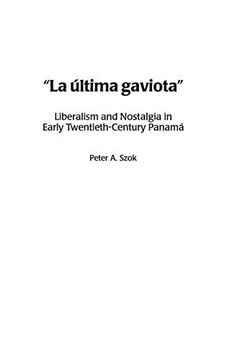Share
La úLtima Gaviota: Liberalism and Nostalgia in Early Twentieth-Century Panam^D'a: Liberalism and Nostalgia in Early Twentieth-Century Panama (Contributions in Latin American Studies) (in English)
Peter A. Szok (Author)
·
Praeger
· Hardcover
La úLtima Gaviota: Liberalism and Nostalgia in Early Twentieth-Century Panam^D'a: Liberalism and Nostalgia in Early Twentieth-Century Panama (Contributions in Latin American Studies) (in English) - Peter A. Szok
$ 85.71
$ 107.14
You save: $ 21.43
Choose the list to add your product or create one New List
✓ Product added successfully to the Wishlist.
Go to My WishlistsIt will be shipped from our warehouse between
Tuesday, July 02 and
Wednesday, July 03.
You will receive it anywhere in United States between 1 and 3 business days after shipment.
Synopsis "La úLtima Gaviota: Liberalism and Nostalgia in Early Twentieth-Century Panam^D'a: Liberalism and Nostalgia in Early Twentieth-Century Panama (Contributions in Latin American Studies) (in English)"
This study examines the development of Panamanian nationalism, focusing on the period from 1903 to 1941. Utilizing historiography, literature, public architecture, and monuments, Szok posits that Panamanian nationalism is, in part, a legacy of the nineteenth century when Panama experienced a nationalist movement typical of the rest of Latin America. This movement was a creation of the country's white elite, who feared the Afro-mestizo masses and sought the protection of outside powers. Later joining forces with the growing middle class, the upper class continued to emphasize liberalism and promoted nostalgia for things Hispanic. This effort left it largely divorced from the Afro-Caribbean culture of the terminal cities and would ultimately contribute to its loss of power in 1968. The elite's goal of constructing an interoceanic canal that would Europeanize the isthmus and open it to investment was realized in 1903 with the intervention of the United States and the separation from Colombia. The canal and independence soon fostered a rising middle class who became disillusioned with post-independence society and the limits placed upon its professional advancement. Once united with the elite in the protection of their own interests, the middle class used nostalgia to protect their social position even as they continued to press for modernization. Szok challenges some long-held stereotypes of Panama, particularly that it was invented by the United States and that its development is unique and thus lies outside the trajectory of Latin America.
- 0% (0)
- 0% (0)
- 0% (0)
- 0% (0)
- 0% (0)
All books in our catalog are Original.
The book is written in English.
The binding of this edition is Hardcover.
✓ Producto agregado correctamente al carro, Ir a Pagar.

